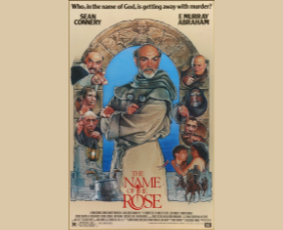The Name of the Rose, Italy/West Germany/France 1986. Directed by Jean-Jacques Annaud, written by Andrew Birkin, Gérard Brach, Howard Franklin, and Alain Godard. Based on the novel The Name of the Rose by Umberto Eco.
CineStar Theater 7, Row 3 Seat 8. Digitized remastered original version.
(This post also appears, in slightly different form, at my Instagram account betweendrafts.)
When I watched the movie and read Eco’s Il nome della rosa in an English translation ages ago, I was impressed with both. A few lifetimes and several years of Medieval Studies at the university later, I’m less impressed. While the book holds up mostly well, the movie has regrettable flaws I didn’t register the first time around.
First, the cast. It’s often praised for its diversity, yet all I see are three trim & proper heroes (William, Adso, Girl) vs. a grotesque menagerie of friars and monks and scribes, with some rather decent-looking Franciscans and rustic villagers on the side. Well, okay.
Then, unsurprisingly with Eco, almost everything in the book is thematically tied to semiotics, and the movie misses the most important motif completely. They all fail: the monks who interpret the events as signs from the Book of Revelation, and William who seeks to uncover the plan and mastermind behind the murders like a classic detective armed with Occam’s Razor. The reason they fail is that their interpretations and conclusions are mere illusions created by the overinterpretation of unreliable signifiers.
Next, Eco already takes some liberties with Bernardo Gui and the Papal Inquisition, i.e., makes them way too powerful for 1327 and even has Gui apply moderate torture. (Changes were in the making, but the Inquisitors did not yet themselves torture, and the historical Gui did explicitly not equate witchcraft with heresy, so the girl hadn’t necessarily been in danger.) But the movie, oh my. It straight up presents Gui like the Spanish Inquisition, officially instituted in 1478, whose reign of terror fell into the Early Modern Age/Renaissance. And that’s really pretty bad, like making a movie about the 1896 Klondike Goldrush that has cnn news helicopters hover over the Chilkoot Pass.
From there, finally, the entire ending is messed up in so many ways. Not only is Adso’s “decision” to leave neither realistically nor thematically tethered to anything in any way; it’s also a flimsy cop out from the corner the screenplay has painted itself into with that ragingly unhistorical Hollywood-at-its-worst Burning at the Stake Last Minute Rescue action.
________________
All Movie Reviews
If you have something valuable to add or some interesting point to discuss, I’ll be looking forward to meeting you at Mastodon!

